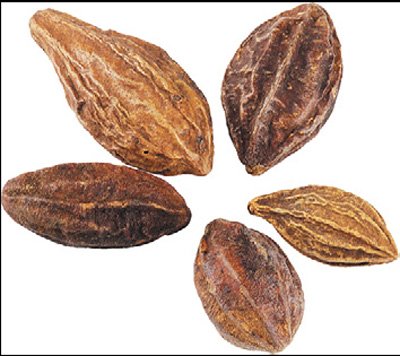Haritaki
Ayurvedic Medicine

Haritaki
Chebulic myrobalan (E), Harde (H), Hara (E):
Haritaki is described as the 'remover of diseases'. Hara is also the name of Lord Shiva, thus reflecting the sacred nature and exalted position of the plant but it literally means 'green' like the fruit. It is also 'abhaya- ' or 'fearless' of any disease. It is said to have originated when a drop of immortal nectar (amr. ta) fell from heaven to earth. It is considered to be the best herb for the digestive system and lungs.
Digestion Its sennosides treat constipation and the tannins treat diarrhoea; use a high dose (6g) for the former and low dose (2g) for the latter. It is salutary in digestive upset or dysentery caused by parasites or infection , inflammation of mucous membranes, flatulence and borborygmus. It increases the digestive fire and clears undigested residues (ama). As it descends apana vayu it treats the root cause of hiccups and piles. Haritaki's astringency and mucous membrane healing effects can benefit prolapse, ulcers, intestinal permeability and 'leaky gut syndrome'. Cholesterol It reduces lipid deposits in the blood and liver. Use with honey to help reduce cholesterol. Lungs Wet, kapha-type coughs are cleared. Haritaki astringes all leakages from the body. It sends accumulated vata downwards and helps to clear wheezing, weak voice and asthma. Eyes Used in all sorts of eye disorders: inflammation, conjunctivitis. Use as a wash. Mucous membranes Gargle in sore throat. Swill for stomatitis, gingivitis and periodontal disease; with cold water this encourages its astringent nature.
 Myrrh
Myrrh Kushtha
Kushtha Psyllium
Psyllium Guggulu
Guggulu Cloves
Cloves Mustard Seed
Mustard Seed Aloe
Aloe Lemon And Lime
Lemon And Lime Coleus
Coleus Bhringaraja
Bhringaraja Ephedra
Ephedra Sandalwood
Sandalwood Test your English Language
Test your English Language  Healthy Breakfast
Healthy Breakfast Benefits of Cucumber
Benefits of Cucumber Swach Bharat Abhiyan
Swach Bharat Abhiyan Weird Hotels around the World
Weird Hotels around the World Solar System
Solar System Precautions while using Computer and Laptops
Precautions while using Computer and Laptops Precaution while using LPG
Precaution while using LPG Best Cities for young People
Best Cities for young People Best Cricketer
Best Cricketer




